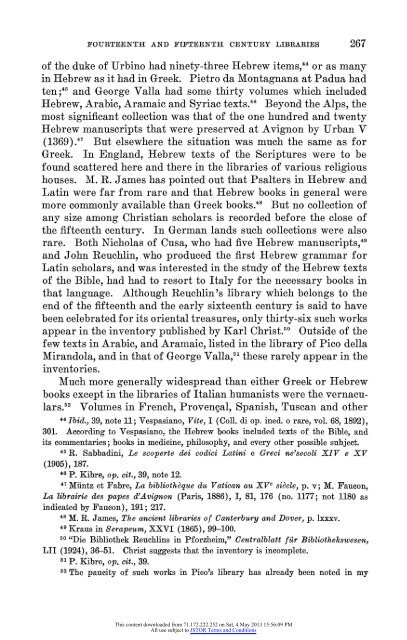The Intellectual Interests Reflected in Libraries of the Fourteenth and ...
The Intellectual Interests Reflected in Libraries of the Fourteenth and ...
The Intellectual Interests Reflected in Libraries of the Fourteenth and ...
You also want an ePaper? Increase the reach of your titles
YUMPU automatically turns print PDFs into web optimized ePapers that Google loves.
FOURTEENTH AND FIFTEENTH CENTURY LIBRARIES 267<br />
<strong>of</strong> <strong>the</strong> duke <strong>of</strong> Urb<strong>in</strong>o had n<strong>in</strong>ety-three Hebrew items," or as many<br />
<strong>in</strong> Hebrew as it had <strong>in</strong> Greek. Pietro da Montagnana at Padua had<br />
ten;45 <strong>and</strong> George Valla had some thirty volumes which <strong>in</strong>cluded<br />
Hebrew, Arabic, Aramaic <strong>and</strong> Syriac texts.46 Beyond <strong>the</strong> Alps, <strong>the</strong><br />
most significant collection was that <strong>of</strong> <strong>the</strong> one hundred <strong>and</strong> twenty<br />
Hebrew manuscripts that were preserved at Avignon by Urban V<br />
(1369)." But elsewhere <strong>the</strong> situation was much <strong>the</strong> same as for<br />
Greek. In Engl<strong>and</strong>, Hebrew texts <strong>of</strong> <strong>the</strong> Scriptures were to be<br />
found scattered here <strong>and</strong> <strong>the</strong>re <strong>in</strong> <strong>the</strong> libraries <strong>of</strong> various religious<br />
houses. M. R. James has po<strong>in</strong>ted out that Psalters <strong>in</strong> Hebrew <strong>and</strong><br />
Lat<strong>in</strong> were far from rare <strong>and</strong> that Hebrew books <strong>in</strong> general were<br />
more commonly available than Greek books." But no collection <strong>of</strong><br />
any size among Christian scholars is recorded before <strong>the</strong> close <strong>of</strong><br />
<strong>the</strong> fifteenth century. In German l<strong>and</strong>s such collections were also<br />
rare. Both Nicholas <strong>of</strong> Cusa, who had five Hebrew manuscripts,49<br />
<strong>and</strong> John Reuchl<strong>in</strong>, who produced <strong>the</strong> first Hebrew grammar for<br />
Lat<strong>in</strong> scholars, <strong>and</strong> was <strong>in</strong>terested <strong>in</strong> <strong>the</strong> study <strong>of</strong> <strong>the</strong> Hebrew texts<br />
<strong>of</strong> <strong>the</strong> Bible, had had to resort to Italy for <strong>the</strong> necessary books <strong>in</strong><br />
that language. Although Reuchl<strong>in</strong>'s library which belongs to <strong>the</strong><br />
end <strong>of</strong> <strong>the</strong> fifteenth <strong>and</strong> <strong>the</strong> early sixteenth century is said to have<br />
been celebrated for its oriental treasures, only thirty-six such works<br />
appear <strong>in</strong> <strong>the</strong> <strong>in</strong>ventory published by Karl Christ.50 Outside <strong>of</strong> <strong>the</strong><br />
few texts <strong>in</strong> Arabic, <strong>and</strong> Aramaic, listed <strong>in</strong> <strong>the</strong> library <strong>of</strong> Pico della<br />
Mir<strong>and</strong>ola, <strong>and</strong> <strong>in</strong> that <strong>of</strong> George Valla,5" <strong>the</strong>se rarely appear <strong>in</strong> <strong>the</strong><br />
<strong>in</strong>ventories.<br />
Much more generally widespread than ei<strong>the</strong>r Greek or Hebrew<br />
books except <strong>in</strong> <strong>the</strong> libraries <strong>of</strong> Italian humanists were <strong>the</strong> vernaculars.52<br />
Volumes <strong>in</strong> French, Provengal, Spanish, Tuscan <strong>and</strong> o<strong>the</strong>r<br />
44Ibid., 39, note 11; Vespasiano, Vite, I (Coll. di op. <strong>in</strong>ed. o rare, vol. 68, 1892),<br />
301. Accord<strong>in</strong>g to Vespasiano, <strong>the</strong> Hebrew books <strong>in</strong>cluded texts <strong>of</strong> <strong>the</strong> Bible, <strong>and</strong><br />
its commentaries; books <strong>in</strong> medic<strong>in</strong>e, philosophy, <strong>and</strong> every o<strong>the</strong>r possible subject.<br />
45 R. Sabbad<strong>in</strong>i, Le scoperte dei codici Lat<strong>in</strong>i e Greci ne'secoli XIV e XV<br />
(1905), 187.<br />
46 P. Kibre, op. cit., 39, note 12.<br />
47 Mi<strong>in</strong>tz et Fabre, La biblio<strong>the</strong>gque du Vatican au XVe siecle, p. v; M. Faucon,<br />
La librairie des papes d'Avignon (Paris, 1886), 1, 81, 176 (no. 1177; not 1180 as<br />
<strong>in</strong>dicated by Faucon), 191; 217.<br />
48 M. R. James, <strong>The</strong> ancient libraries <strong>of</strong> Canterbury <strong>and</strong> Dover, p. lxxxv.<br />
49 Kraus <strong>in</strong> Serapeum, XXVI (1865), 99-100.<br />
50 "vDie Biblio<strong>the</strong>k Reuchl<strong>in</strong>s <strong>in</strong> Pforzheim," Centralblatt fur Biblio<strong>the</strong>kswesen,<br />
LII (1924), 36-51. Christ suggests that <strong>the</strong> <strong>in</strong>ventory is <strong>in</strong>complete.<br />
51 P. Kibre, op. cit., 39.<br />
52 <strong>The</strong> paucity <strong>of</strong> such works <strong>in</strong> Pico's library has already been noted <strong>in</strong> my<br />
This content downloaded from 71.172.222.252 on Sat, 4 May 2013 15:56:09 PM<br />
All use subject to JSTOR Terms <strong>and</strong> Conditions

















